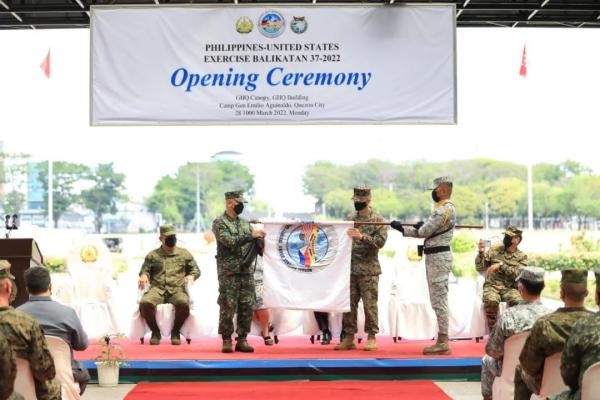
The US and the Philippines hold Balikatan (shoulder to shoulder) joint military exercises.
By Liu Lin
On April 3, the Philippine government announced the location of four new military bases to be used by US troops as agreed in February 2023. The bases in Cagayan province and Isabela province respectively located in the north and northeast of Luzon Island are very close to China’s Taiwan region, and the base on Balabac Island is adjacent to the South China Sea.
These distinctly reflect the closer military relationship between the Philippines and the US since the inauguration of Philippine President Ferdinand Romualdez Marcos in June 2022. The two parties also took a series of actions to consolidate and strengthen their military alliance, which jeopardized the situation of the South China Sea and the Taiwan Strait and aroused concern and controversy in the Philippines and in the international community.
The US-Philippine accelerated military cooperation under the influence of many factors.
First, the Philippines plays a more important role in the American Indo-Pacific Strategy of “containing China". Bordering two biggest potential conflict points – the South China Sea and the Taiwan Strait makes it an increasingly prominent pivot in the strategic deployment of the US.
Second, the US has enhanced military needs on the Philippines. In addition to its potential influence in the South China Sea issue, the Philippines is also possible to act as a "helper" for the US in addressing the so-called Taiwan strait crisis because it is the closest to China’s Taiwan Island among US’ five allies in the Indo-Pacific region.Third, the pro-US policy of the Marcos government creates favorable conditions for the advancement of their military relationship. Although the new president declared to stick to independent foreign policy, his favor in the US-Philippine alliance is apparently stronger than his predecessor. Marcos once stated bluntly that he couldn’t imagine Manila's future without Washington as its partner.
Fourth, the Biden administration is devoted to building up the Indo-Pacific alliance network, and gives more weight to cooperation with Japan, Australia and other countries amid the China-US strategic competition, to shape the "US and Philippines Plus" model.
However, the military cooperation between the US and the Philippines also have some constraints.
First, the Philippines is faced with domestic pressures. The Philippines was under the colonial rule of the US for half a century, during which the Philippine elites were deeply influenced by the West, but the common Philippine people didn’t enjoy any benefits under the US governance. Anti-American forces still exist here due to historical and practical reasons. As for the increasing military bases, nearly half of the public harbors doubts, and around 30% expressed firm opposition. Some scholars and local officials still worry that the inordinate progress of the US-Philippine military relationship would endanger their country and degrade it as a puppet of America.
Second, the Philippines still considers to strike a balance amid China-US competition. Amid the intensified strategic competition between China and the US, the Philippines seeks to gain profits and mitigate risks by taking advantage of the check-and-balance of these two great powers. Marcos advocates an independent diplomatic policy and relies on China's support to address priority economic and livelihood tasks. Therefore, the Philippines needs to pay close attention to the limitations of US-Philippine defense cooperation and minimize its impact on China-Philippine relations. The country still pursues a balancing policy.
Third, the US and the Philippines still have some particular challenges in their military cooperation, including legal immunity of the US army, sustainability of the infrastructure investment, and divergence on certain cooperation terms.
The inclination of expanding military cooperation between the US and the Philippines is detrimental to regional security and stability. As China's Foreign Ministry spokesperson said, the US, out of self-serving interests and with a zero-sum game mentality, takes its own course to strengthen military deployment in the Asia-Pacific region, which will inevitably intensify the regional situation. Therefore, countries in the region should deliberate which actions and choices are appropriate and beneficial for their own interest and regional peace and stability.
Editor's note: The author is a researcher of the PLA Academy of Military Sciences.) Originally published on thepaper.cn, this article is translated from Chinese into English and edited by the China Military Online. The information and opinions in this article do not necessarily reflect the views of eng.chinamil.com.cn.













